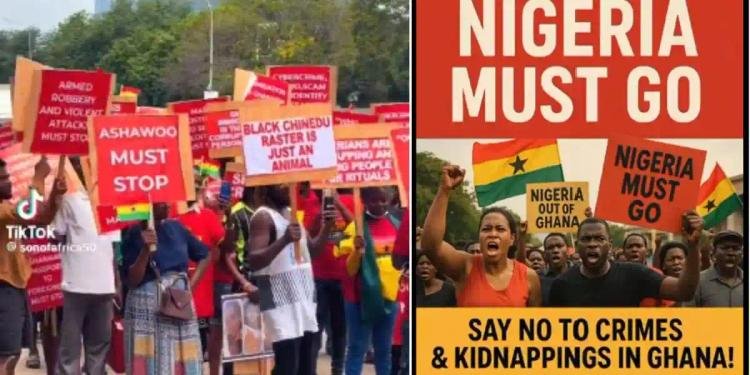By Abdulkarim Ibrahim
Protests erupted in Ghana, with groups demanding the expulsion of Nigerians over alleged crimes. Demonstrators claimed Nigerians were responsible for rising prostitution, ritual killings, and economic dominance, among other issues.
Videos on social media showed protesters carrying placards with inflammatory messages, including claims that Nigerians were involved in kidnappings, ritual killings, and contributing to the spread of health risks due to prostitution. The protests highlight tensions between Ghanaians and Nigerians.
A woman, appearing in one of the protest videos, shouted, “Nigerians must go because you can’t be in someone’s country and be doing anyhow. Nigerians must go.” Another protester accused Nigerians, especially those of Igbo descent, of dominating local markets and land ownership: “They even have an Igbo king in Ghana. They have hijacked our lands. It is just a matter of time; we will conquer them and take over our country.” The Guardian reports
Protesters in Ghana demanded the expulsion of Nigerians, citing alleged crimes such as ritual killings and prostitution. They displayed an image of a man claimed to have been killed by a Nigerian in Accra, further inflaming tensions.
There were no independent confirmations of the incident or claims made during the protest. The Ghanaian government had not issued an official statement addressing the protest or clarifying its stance on Nigerians living in the country.
The development has sparked concerns over potential diplomatic tensions between Ghana and Nigeria, particularly given their historical context. A similar expulsion order by Nigeria’s President Shehu Shagari in 1983, targeting mostly Ghanaian immigrants, adds to the sensitivity of the situation.
The episode, remembered through the phrase “Ghana must go,” remains a sensitive chapter in the countries’ shared history.
In 1983, Nigeria’s President Shehu Shagari ordered the expulsion of nearly two million undocumented immigrants, mostly Ghanaians, citing economic pressures. Shagari’s stance was clear, stating that those who break the law must face the consequences.
The protests against Nigerian immigrants mark a significant expression of resentment. Demonstrators cited concerns over crime and economic competition, reigniting debates on immigration policy and xenophobia in West Africa.
At the time of reporting, no Nigerian government official had publicly responded to the protests. The situation highlights the complexities of regional dynamics and immigration policies in West Africa.
